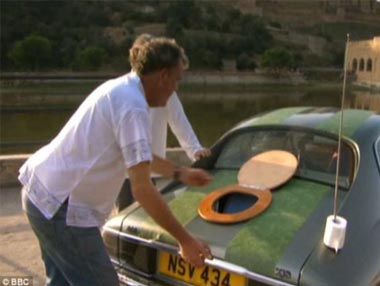Is it bad that I found the Top Gear India special funny? It would appear so, according to the Indian High Commission in London which argued it was “tasteless”. Except it’s Top Gear - you don’t really expect much from it other than cars, cinematic filming and jokes, frequently tasteless ones. Clearly nobody at the High Commission has ever seen the programme if they thought Top Gear was going to make a “documentary”. Um, no. Top Gear is spectacle and entertainment. [caption id=“attachment_182597” align=“alignleft” width=“380” caption=“Screengrab form the BBC.”]  [/caption] So why is this story still going? Maybe it’s something in the British air that makes its press, and the Indian High Commission apparently, constantly need to complain. If utopia was discovered tomorrow, The Guardian would question, “Do we really know that it’s utopia?”, while the Daily Mail would cry, “Utopia causes cancer!”. Some media outlets could probably try to justify this as “balance” - ie finding the most vocal person who has an objection. Reporting isn’t simply about finding the most diametrically opposed views. Just because you interview someone about being subjected to racist abuse, doesn’t mean you find someone who will back up the racist views. Writing about what was on TV last night is ideal for newspapers - find something objectionable about the show and you get a headline attacking the show millions of people watched. What an easy way to get readers - millions of Britons and Indians watched Top Gear so we’ll just say it was offensive and everyone will click that link. There’s plenty of disagreement and conflict in the world - it’s generally not necessary for us to cause more. But people love a good fight. Politicians have to be seen to be active. They “demand” inquiries in the media, “call for” resignations - all active, not passive verbs. The public loves or loathes its TV programmes, so they make for easy targets to prompt tales of dissent. The Twitter reaction in India to the Top Gear controversy was largely one of “get over it”. Those individuals may have a better sense of humour than the British press certainly, but also a realism about the media world and its manufactured conflicts. We take the intelligence of readers and viewers for granted all too easily. Watching an entertainment programme like Top Gear or even reading celebrity gossip doesn’t make you dumb - it’s just personal taste and desire for a distraction. Top Gear understands what it does, and understands its viewers so well that it is one of the most popular BBC exports worldwide. So when they set up banners on a train to rip and create “tasteless” phrases, of course we know it is manufactured, but we still laugh. We laugh at them, at the artifice of it all, and at the people who take it too seriously. We laugh at Jeremy Clarkson - and that’s pretty much all he’s useful for in the press, and he’s not even a professional comedian. Nobody was laughing at India after Top Gear’s special. But we’re laughing at the Indian High Commission and the media now thanks to this non-story.
Watching an entertainment programme like Top Gear doesn’t make you dumb - it’s just personal taste and desire for a distraction. Top Gear understands what it does, and understands its viewers so well that it is one of the most popular BBC exports worldwide.
Advertisement
End of Article
Written by Tristan Stewart Robertson
Tristan Stewart-Robertson is a journalist based in Glasgow, Scotland. He writes for Firstpost on the media, internet and serves as an objective, moral compass from the outside. see more


)
)
)
)
)
)
)
)
)



